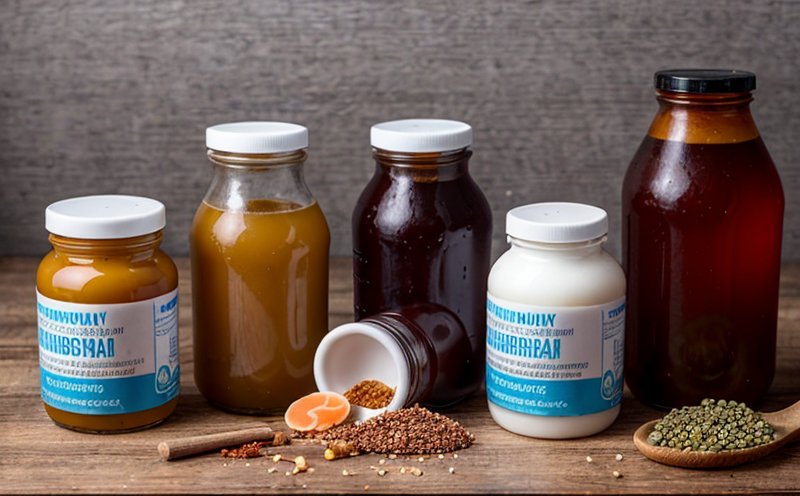Probiotics & Fermented Products Microbiology Testing
The microbiology testing of probiotics and fermented products is a critical component in ensuring the safety, quality, and efficacy of these food supplements. This process involves the identification, enumeration, and characterization of microorganisms present in such products to guarantee they meet regulatory standards and consumer expectations.
Probiotics are live microorganisms that provide health benefits when consumed as part of the diet. Commonly found in dairy products like yogurt or dietary supplements, probiotics must be free from harmful pathogens and ensure a consistent probiotic population for efficacy. Similarly, fermented products such as sauerkraut, kimchi, and kefir require microbiological testing to confirm their safety and quality.
The first step in this process is the identification of microorganisms using advanced techniques like polymerase chain reaction (PCR) or matrix-assisted laser desorption ionization-time of flight mass spectrometry (MALDI-TOF MS). Enumeration methods include viable cell counting, colony-forming unit (CFU) counts, and adenosine triphosphate (ATP) testing. For probiotics specifically, the presence and viability of specific strains are crucial.
Acceptance criteria for these tests vary depending on the specific product and regulatory requirements. For instance, the ISO 22325:2019 standard provides guidelines for the microbiological examination of probiotic food supplements. Compliance with these standards ensures that products meet safety and quality benchmarks.
The testing process also includes checking for potential contaminants such as pathogenic bacteria (e.g., Salmonella, Listeria), fungi (e.g., Aspergillus), and other undesirable microorganisms. The absence of these contaminants is essential to prevent foodborne illnesses. Additionally, tests are conducted to ensure the product's shelf-life stability by evaluating microbial growth at different temperatures.
| Applied Standards |
|---|
| ISO 22325:2019 - Microbiological examination of probiotic food supplements |
| ASTM E3487-16 - Standard test method for determining the presence and viability of microorganisms in fermented products using culture-based methods |
| EN 3250:2009 - Microbiological examination of fermented foods |
The application of these standards ensures that microbiological testing is conducted consistently and accurately, providing reliable data for regulatory compliance and product safety.
Applied Standards
| Applied Standards |
|---|
| ISO 22325:2019 - Microbiological examination of probiotic food supplements |
| ASTM E3487-16 - Standard test method for determining the presence and viability of microorganisms in fermented products using culture-based methods |
| EN 3250:2009 - Microbiological examination of fermented foods |
The microbiology testing of probiotics and fermented products is governed by several international standards. The ISO 22325 standard provides guidelines for the microbiological examination of probiotic food supplements, ensuring that these products meet safety and quality benchmarks.
ASTM E3487-16 focuses on determining the presence and viability of microorganisms in fermented products using culture-based methods. This ensures that the test accurately identifies and counts viable cells, which is crucial for both probiotics and fermented foods.
The EN 3250 standard provides a framework for microbiological examination of fermented foods, ensuring consistency across different products and regions.
Industry Applications
- Fermented dairy products like yogurt and kefir require regular testing to ensure the presence of live cultures and absence of contaminants.
- Dietary supplements containing probiotics must be tested for strain viability, contamination levels, and overall microbial quality.
- Pickled vegetables such as kimchi and sauerkraut need microbiological examination to confirm safety and consistent fermentation processes.
The microbiology testing of probiotics and fermented products is essential across various industries. Fermented dairy products like yogurt and kefir must be tested regularly to ensure the presence of live cultures and absence of contaminants. Dietary supplements containing probiotics require rigorous testing for strain viability, contamination levels, and overall microbial quality. Pickled vegetables such as kimchi and sauerkraut need microbiological examination to confirm safety and consistent fermentation processes.
Why Choose This Test
- Ensure regulatory compliance with international standards like ISO 22325:2019, ASTM E3487-16, and EN 3250.
- Provide reliable data for product safety and quality assurance.
- Identify potential contaminants that could lead to foodborne illnesses.
Microbiological testing of probiotics and fermented products offers several advantages. It ensures regulatory compliance with international standards such as ISO 22325:2019, ASTM E3487-16, and EN 3250. Reliable data is provided for product safety and quality assurance, ensuring that the final product meets consumer expectations. Additionally, this testing identifies potential contaminants that could lead to foodborne illnesses, protecting public health.





